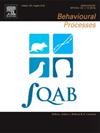Cost does not prevent pigeons from investing in the future
IF 1.3
4区 生物学
Q4 BEHAVIORAL SCIENCES
引用次数: 0
Abstract
One of the simplest forms of behavior, operant behavior, appears fundamentally prospective, implying potential similarity to ‘sophisticated’ prospective behaviors like planning in terms of underlying mechanisms. But differences between paradigms for studying behavior resulting from ‘simple’ versus ‘sophisticated’ mechanisms prevent true comparison of underlying mechanisms. To aid development of an operant paradigm with more similarity to ‘sophisticated’ prospective paradigms, we replicated and extended Cowie and Davison’s (2021) investing task. Pigeons were required to emit an investing response to ensure food at a different time and different response location. We asked if investing depended on whether the behavior was a single, discrete key peck (typical in operant paradigms) or an extended sequence of pecks (echoing behaviors in planning paradigms), and whether facilitative effects of an immediate stimulus change persisted when the stimulus change no longer occurred. Pigeons invested successfully whether investing required one or more responses, and for extended investing responses, performance did not worsen significantly with increasing response requirements. Experience investing with an immediate stimulus change did not enhance subsequent investing without the stimulus change. Findings show simple learning mechanisms can support extended activities with no immediate consequences. Further, they support the investing paradigm as a potential tool for investigations of overlap in mechanisms controlling ‘simple’ and ‘sophisticated’ behavior.
成本并不妨碍鸽子投资未来。
操作行为是最简单的行为形式之一,从根本上看,它是一种前瞻性行为,这意味着它与 "复杂 "的前瞻性行为(如计划行为)在内在机制上可能有相似之处。但是,"简单 "与 "复杂 "机制导致的行为研究范式之间的差异,阻碍了对潜在机制的真正比较。为了帮助开发一种与 "复杂 "前瞻性范式更相似的操作性范式,我们复制并扩展了考伊和戴维森(2021年)的投资任务。我们要求鸽子在不同的时间和不同的反应位置做出投资反应,以确保获得食物。我们的问题是,投资是否取决于该行为是单次、离散的啄键(操作性范式中的典型行为)还是一连串的啄键(计划性范式中的呼应行为),以及当刺激变化不再发生时,即时刺激变化的促进作用是否会持续。无论投资是否需要一个或多个反应,鸽子都能成功进行投资;对于延长的投资反应,鸽子的表现并没有随着反应要求的增加而显著恶化。在刺激物立即发生变化的情况下进行投资的经验并不会增强随后在刺激物没有变化的情况下进行投资的能力。研究结果表明,简单的学习机制可以支持没有直接后果的扩展活动。此外,这些研究还支持将投资范式作为一种潜在的工具,用于研究控制 "简单 "和 "复杂 "行为的机制之间的重叠。
本文章由计算机程序翻译,如有差异,请以英文原文为准。
求助全文
约1分钟内获得全文
求助全文
来源期刊

Behavioural Processes
生物-动物学
CiteScore
2.70
自引率
7.70%
发文量
144
审稿时长
4-8 weeks
期刊介绍:
Behavioural Processes is dedicated to the publication of high-quality original research on animal behaviour from any theoretical perspective. It welcomes contributions that consider animal behaviour from behavioural analytic, cognitive, ethological, ecological and evolutionary points of view. This list is not intended to be exhaustive, and papers that integrate theory and methodology across disciplines are particularly welcome.
 求助内容:
求助内容: 应助结果提醒方式:
应助结果提醒方式:


